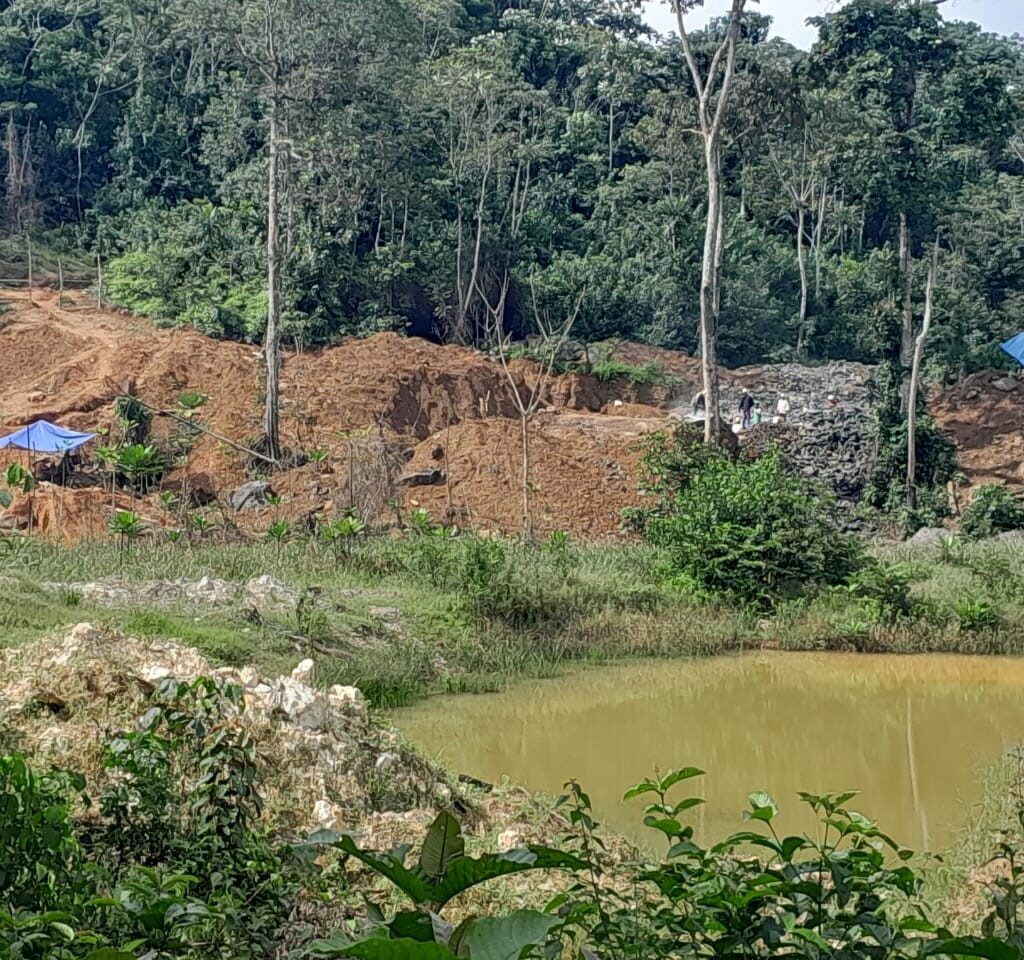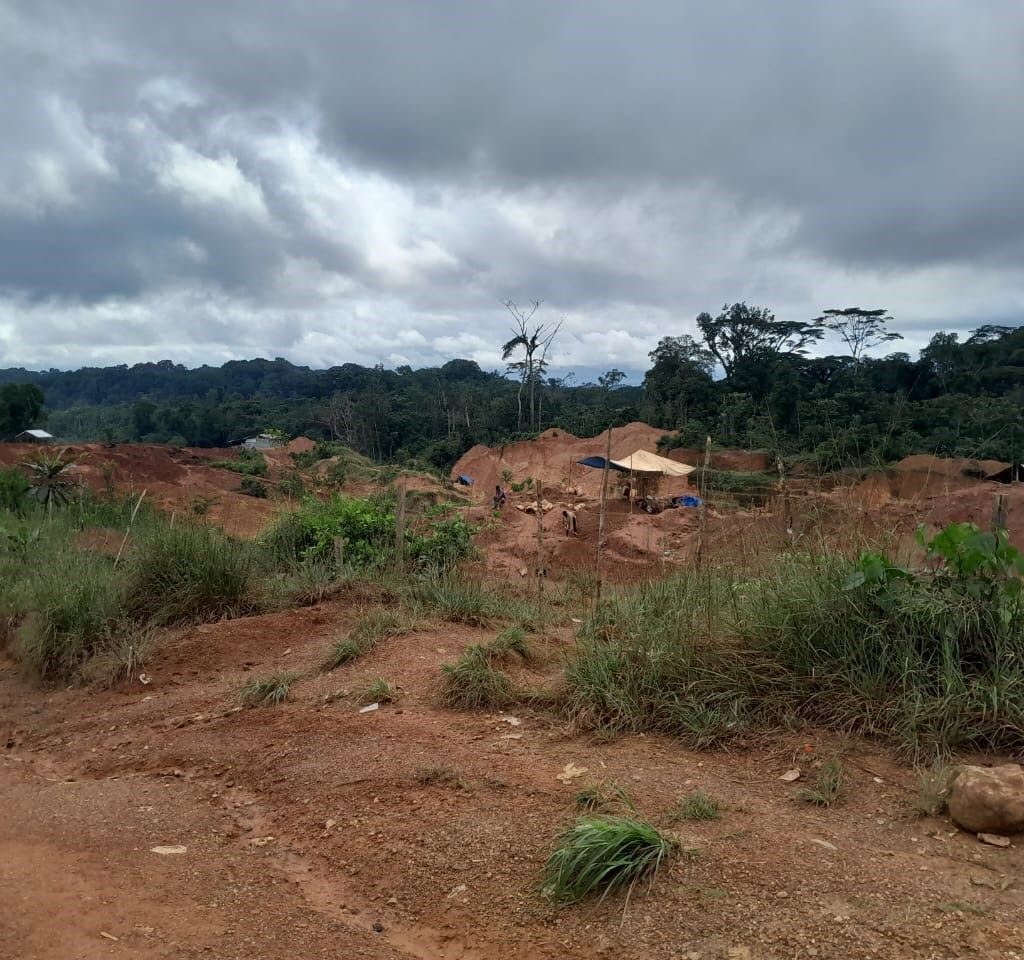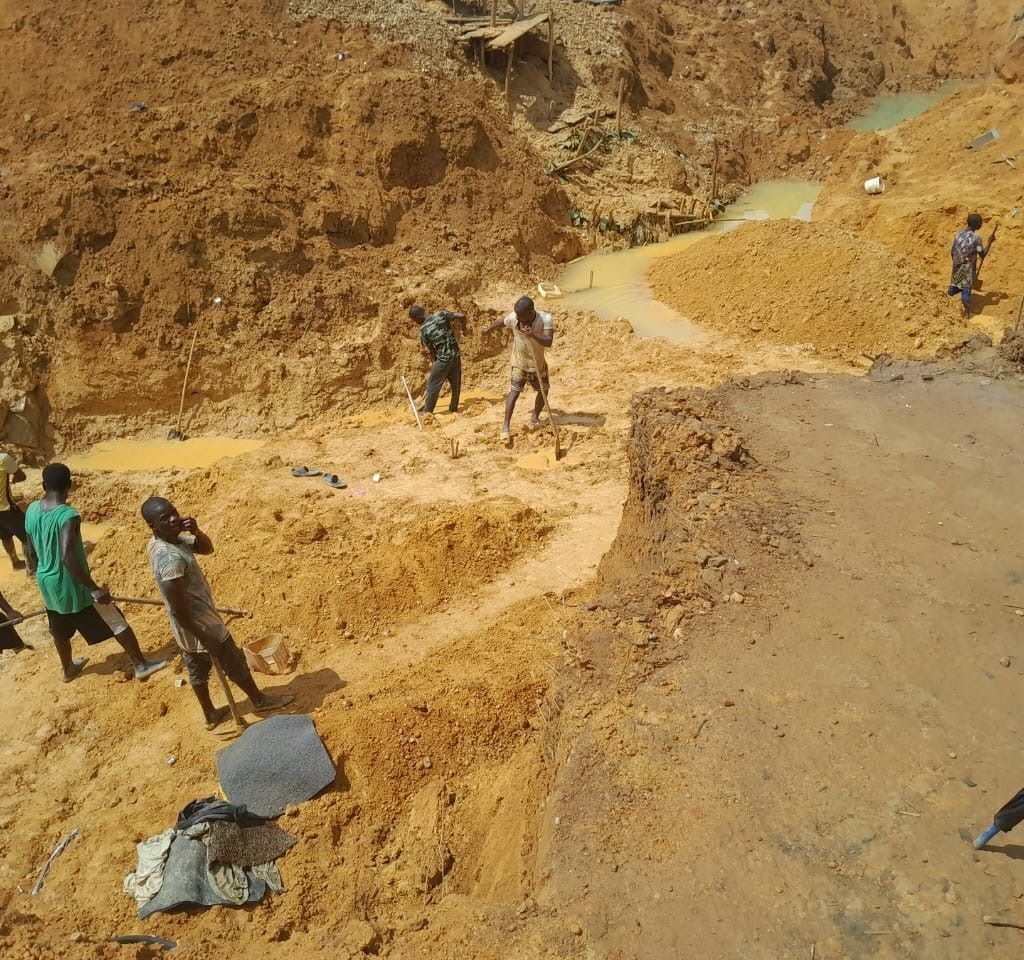Amid Bribery & Collusion Accusations
Photo of a mining site captured over the Planson River in lower Kpanyan District, Sinoe County
By: Ezekiel Geeplay, Forest and Environmental Reporter ezekielgeeplay.105.5@gmail.com
GREENVILLE, Liberia – The Liberian government’s ban on dredge mining, intended to safeguard the environment and water resources, faces widespread violations amid accusations of mining agents receiving bribes. The violations have led to visible severe environmental degradation and water pollution in the southeastern Sinoe County.
Dredge mining, a practice that involves the excavation of riverbeds and waterways for mineral resources, is known to result in significant negative impacts on the environment. These impacts, observed throughout this County, include deforestation, erosion, contamination of water and soil profiles, pollution of local streams and wetlands, and an increase in noise levels. Dredge mining also has the potential to displace entire communities from their homes, leading to a range of societal issues, including the loss of cultural identity, security concerns, and health problems such as malnutrition, poor health, diarrhea, dysentery, and the spread of infectious diseases.
In response to the environmental risks associated with dredge mining, the Liberian government issued a ban on the practice in 2019, accompanied by warnings of legal penalties for those caught in violation.
However, four years later, it appears that this ban is being disregarded by relevant authorities, particularly representatives of the Ministry of Mines and Energy who have the legal responsible for regulating the mining sector.

Copy of the government’s ban order
The violation of the dredge mining ban is most prominently observed in several areas of Sinoe County, including Draoh Karquakpo, Titiyen, Swempo, Dyankpo, Sunshine, Government camp, and even Kpanyan along the Plazon River.
The practice has also encroached upon the coastline in Greenville, something that is threatening the Sapo National Park, a protected area designated for forest conservation.
Despite the government’s clear ban on dredge mining, Sinoe County remains one of the hardest-hit counties. This unlawful practice continues with the participation of both Liberian and foreign nationals who appear to have ignored the government’s directive.
During interviews conducted in Dugba River District, Ernest Slah, a former city mayor and opinion leader, expressed deep concern over the ongoing dredge mining and the pollution it causes.
He highlighted the contamination of major creeks and rivers that local residents rely on for drinking water. In some communities, access to clean water is extremely limited, with only one private hand pump serving thousands.
“The contamination of our major creeks and rivers, including the Dugba River, is a grave concern. We are aware that we are drinking from these water sources, and it is disheartening to see that the ban is not effectively enforced,” Slah stated in frustration.
Slah also raised questions about the Ministry of Mines and Energy’s enforcement efforts, suggesting that weak enforcement has allowed these violations to persist. He pointed out the alarming health issues affecting local communities due to water pollution and expressed frustration over the lack of government action.

Neplakpo Mining Site in Meaniah town of Dugba District, Sinoe County
The violation of the dredge mining ban has also led to allegations of collusion and corruption. Community members claim that when they approach miners, they are often directed to local agents of the Ministry of Mines and Energy, who allegedly receive benefits meant for the communities. Some miners themselves corroborated these claims but chose to remain anonymous.
Sinoe County, despite its rich natural resources, continues to grapple with poverty, contributing to the rise of illicit mining activities. Olivia Young, who chairs the rural United Kru Women and hails from Dugba district in Sinoe’s electoral district #2, revealed that several written communications highlighting the negative impact of mining have gone unanswered by the local county administration.
“While the Ministry of Mines and Energy generates revenue for the government from this sector, measures for prevention and control, as well as benefits for affected communities like ours, should be taken into consideration,” Young emphasized.
Young directly accused mining agents of collaborating with numerous illegal miners for personal gain, suggesting that these agents associated with the Ministry of Mines and Energy oversee a network of illicit miners across the county.
“How can we expect all of this to stop when the very individuals entrusted by the government are alleged to be involved and have their own working groups using dredges in our rivers and creeks? The government needs to take this matter seriously and closely monitor the individuals it sends on assignments,” she pleaded.
We presented these concerns raised by local communities to Sinoe Tanneh Borteh, the Ministry of Mines and Energy’s assigned agent, who vehemently denied allegations of collusion with miners.
Borteh asserted that none of his team members were involved in gold mining and clarified that their responsibility was to carry out government work. He emphasized that no team member was engaged in gold mining or supported those involved in it.
The issue of dredge mining is one that the Ministry of Mines and Energy has been actively addressing, according to Obediah Arku Joshua, the Ministry’s Inspector General. He acknowledged that challenges exist, particularly related to the resistance of affected community members who rely on mining for their livelihoods.
“When we conduct field inspections to enforce regulations, the locals often obstruct us, claiming that we are disrupting their mining work, which they depend on for survival. They accuse the government of not providing alternative livelihood opportunities,” Joshua explained.
Joshua also highlighted the transient nature of dredge mining, noting that miners could quickly relocate when authorities conduct inspections.
He clarified that mining agents in the field were administrators, not law enforcement officers. When law enforcement assistance was required during inspections, they had to pay an unspecified amount to the police for support. However, the police claimed that they had never received such requests from the Ministry of Mines and Energy in Sinoe County.
Joshua further pointed out that miners often sought protection from local authorities, paying fees to these officials to safeguard their interests. This practice he said severely undermines the Ministry’s efforts to regulate mining activities across Liberia.

Photo of Titiyen affected site in Dugba District Sinoe County
Apart from local resistance, a lack of resources, including vehicles and budgetary allotments, has hindered the Ministry’s ability to conduct proper monitoring and enforcement. Joshua noted that the Ministry’s annual budget primarily covered salaries, with minimal funding allocated for operational activities. Out of a requested 6 million dollars requested in budgetary allotment, only 1.2 million was received, further limiting their capacity.
Given the current election period, Joshua indicated that significant progress would only be possible in the next budget year, with hopes of securing the necessary resources for effective enforcement and regulation within the mining sector.
During our investigative tour, it became evident that approximately 40% of these illegal miners are foreigners, primarily from neighboring countries. They engage in dredge mining using mercury, “American and Ghanaian Zien, and Katakata” machines in rivers and creeks.
The use of mercury in mining has both medical and environmental repercussions. It releases mercury vapor into the environment, even when equipment is used to capture the vapor. Mercury can contaminate soil and water when discarded with other waste materials from the mining process.
Illegal mining activities do not only harm rivers and creeks; they also contribute to soil profile depletion, erosion, and damage to the forest ecosystem. Another government agency responsible for addressing environmental concerns is the Environmental Protection Agency (EPA). EPA’s Head of Communication and Corporate Services, Denise Love Dennis, stated that the agency has observed ongoing illegal dredge mining during its recent nationwide environmental compliance monitoring efforts.
Dennis emphasized the need for cooperation among various government bodies, including the Ministry of Mines and Energy, the Liberia National Police, and the Liberia Maritime Authority, to tackle the ongoing illegal dredge mining issue. She stressed the importance of coordinated efforts to address water and soil quality regulations and the need for mining operations to comply with environmental protection laws.
The EPA has developed regulations, including procedures for sustainable mining practices through its Environmental and Social Impact Assessment process. These regulations cover water and soil quality standards and include measures to mitigate the environmental impacts of mining operations. However, adherence to these provisions remains a challenge, especially in the artisanal and small-scale mining sector.
The Liberia Maritime Authority issues licenses for dredging operations in Liberian waters, while the Ministry of Mines and Energy is responsible for granting permits for mining through dredging. EPA’s strong coordination with these bodies is essential, especially as a task force is being formed to address sand mining operations.

Ptoto of an undermined site in Sunshin, Jladae District, Sinoe County
Illegal gold mining in Sinoe County not only affects residents but also encroaches on the forest reserves, particularly the Sapo National Park, which is protected by law. According to the Forestry Development Authority (FDA), over 5,000 illegal miners, including farmers and foreign nationals, had occupied the park. Recent efforts by members of the National Traditional Council in the southeast led to the removal of these some illegal occupants, declaring the park a no-go zone.
Jerry Nyoma, FDA Technical Manager for Conservation, confirmed the presence of foreign miners from, Ghana, and Ivory Coast who had unlawfully entered the forest using canoes and boats to mine gold. These miners he said operated without authorization, violating both immigration and mining laws of Liberia.
Local efforts, including patrols by immigration officials, county leaders, and the police, have often failed to apprehend these illegal miners. Sources suggest that foreign miners pay unspecified fees monthly to agents of the Ministry of Mines and Energy, the police, Liberia Immigration Service, and local county leadership to avoid arrest.
The Liberia Immigration Service (LIS) confirmed that these Ghanaian and Ivorian miners were residing in Liberia without proper permits for mining. While some of these foreign miners possessed residential permits, they were not authorized to engage in mining activities. The LIS clarified that permits issued were for residence purposes, not specific work for mining in Liberia.
However, some of these miners mostly Liberians expressed discomfort with their involvement in illegal mining, citing a lack of alternative job opportunities. They emphasized that they resorted to mining as a means of survival and to provide for their families.
From field observations, it is estimated that approximately thirty dredges operate at separate mining sites in Sinoe County, each with 20-25 individuals involved in operations.
Efforts to contact Sinoe County local authorities, including the superintendent and legislators, were unsuccessful due to “busy schedules” and limited accessibility.
The violation of the dredge mining ban in Sinoe County poses significant environmental and social challenges.
Despite government’s regulations, weak enforcement, community assistance, and collusion with miners continue to allow illegal mining to thrive. Addressing these issues requires a concerted efforts from various government bodies to protect Liberia’s natural resources and environment.

